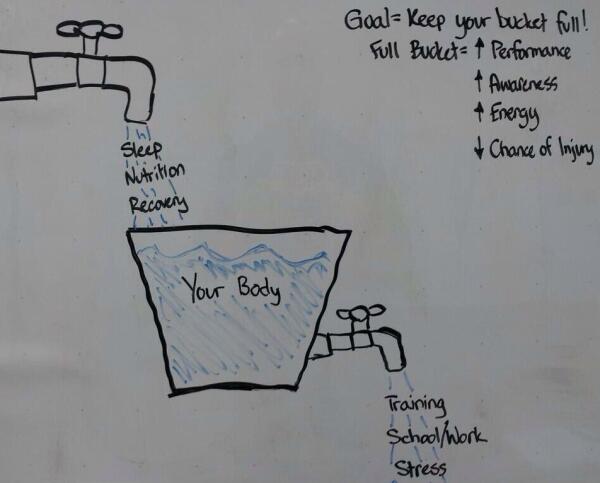Keep Your Bucket Full
As a self-proclaimed master of analogies, I am always on the lookout for new ways to concisely explain complex training concepts. To be successful as a coach you have to be able to say the same thing several different ways. A single analogy will rarely be grasped by all the members of a given group, so having a quiver full of them for each and every topic is a necessity. In the past, most of us coaches learned our analogies from the coaches who mentored us or with whom we associated. With the proliferation of social media, however, we now have a huge database to draw from. As a regular Twitterverse peruser, I often happen upon some very useful analogies...and I recently came across one that is perfect to share at this time of year. It comes from a sports performance training center in Wales and it paints an awesome picture of how to have a successful season. Keep you bucket full!
Endurance athletes are notorious for burning the candle at both ends. We strive to be successful in all aspects of life and are willing to put in the work to get there. As a result, however, we often neglect parts of the puzzle that don't appear to contribute directly to our success. The important training aspects of Sleep, Nutrition, and Recovery tend to get overlooked. We push, push, and push. The idea of relaxing and recovering is foreign to us. If all we do is push - and we neglect the supplemental stuff that lets our body adapt to that training - injuries and poor performance are likely not far behind.
Now, to the analogy. Imagine you are a bucket filled with water. Everything you do draws a little bit of water out of the bucket. The bigger the stressor the more water you lose. For example, a long run will take out more water than a short run; a stressful day at work will take out more water than a relaxed day at home. Our goal each day is to refill the water we lost so we always keep our bucket full. The three ways to refill our bucket are Sleep, Nutrition, Recovery.

- Sleep - Sleep may be the most commonly overlooked aspect of training. As we sleep, our body releases HGH (human growth hormone) to help rebuild the muscles that were damaged in training. In a recent study of elite athletes in multiple sports, most slept at least 10 hours per night. If athletics was your job, you'd make sure you got that much sleep. Since almost everyone reading this article doesn't have that opportunity (and is not a professional athlete), we need to make getting as much sleep as possible a priority. In addition to getting enough sleep, we also need to recognize that our body craves a sleep schedule. We get deeper, more restful sleep when we follow a regular schedule.
- Nutrition - We need to eat healthy, right? Well, yes, that is one aspect of nutrition. However, there is more to an athlete's diet than simply making healthy choices. Firstly, diet doesn't mean deprivation. Too often, we neglect to refill what we poured out because it feels like too much. As an endurance athlete, you are probably burning more calories than you think. Eating to refuel almost becomes a job when you're in the middle of high volume, quality training. Work to refuel with nutritionally dense foods within 30 minutes after your workout. During that window your body will best utilize that food to rebuild the muscles.
- Recovery - While sleep and nutrition are often considered necessary to "recovery," in this case we are defining Recovery work as stretching, massage, and other body manipulation work. When you consider that we take around 1500 steps per mile and impact loads are three to five times your body weight, it should come as no surprise that our body needs more than just a brief stretching session to keep our buckets from running dry. Foam rolling, for example, does a tremendous job of breaking up the myofascial adhesions that develop throughout training. It's a must-do.
By keeping your bucket full,you'll see better performances, have more energy, and suffer fewer injuries. The better job you do in consistently keeping your bucket full, the happier and healthier you'll be.
Good Luck and Happy Racing!
Coach Cary
Connect With Us
see the latest from Fleet Feet St. Louis